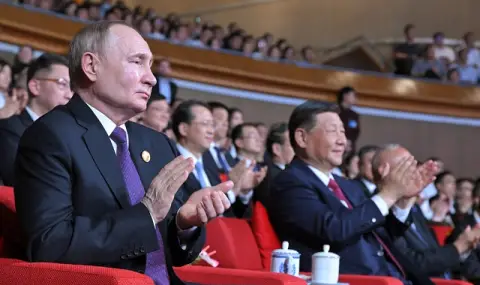If the conflict between China and the US escalates, the BRICS countries will scatter into different camps, predicts political scientist Anton Barbashin. How united are the countries of the organization and what goals does Russia pursue?
In the Russian city of Kazan, the annual summit meeting of the countries of the BRICS economic union is held. 24 state leaders are participating in it, including Russian President Vladimir Putin. He did not attend the previous meeting - in South Africa, possibly for fear of being detained because of the arrest warrant issued by the International Criminal Court.
This year, four new countries joined the organization, which until recently consisted of only Brazil, India, China, Russia and South Africa - Egypt, Ethiopia, Iran and the United Arab Emirates (UAE). Moscow claims interest in the organization is growing and 34 other countries want to partner with BRICS "in various ways”.
A new global payment system?
One of the main topics that will be discussed in Kazan is the new BRICS payment system - "Bridge", which the Russian Finance Ministry presented at the beginning of October. It aims to enable "fast and cheap" transfers of funds between countries in the respective national currencies without having to go through intermediary banks in the US. According to the magazine "Economist" Moscow wants to use this new method to circumvent international sanctions that prevent Russia from making international transfers in dollars.
The planned system is already troubling Western financial regulators, but its creation will be complicated. Those participating in it will have to finance it from their state budgets, and it could also create problems for national regulators if, for example, a country accumulates too large a foreign currency reserve. Russia's motive is clear, writes "Economist", but why do the other BRICS countries need a similar payment system?
Attractive ideas for developing countries
Evgeny Kogan from the Russian University of Economics writes on his channel in "Telegram" that the BRICS countries have so far shown no particular desire to protect Russia from international sanctions. For example, the New Development Bank, which was founded by the BRICS in 2022, complied with the sanctions against Russia. Kogan also notes that the total population of all BRICS countries is 3.5 billion people - about 45% of the world's population. However, their share of the world gross domestic product (GDP) is 37.3%. His conclusion is that it is "too early to talk about a new world order".
However, developing countries are interested in BRICS and its potential payment system. "Their goal is not to annoy the US, but simply to make faster payments," the economist believes. Between five and seven percent of international payments in US dollars are delayed because of the need to comply with US banks. They aim to protect against insider trading, money laundering and terrorist financing, among other things.
BRICS members: competition and disagreements
Moscow, however, has definitely succeeded in positioning BRICS as the format of the "new world order", explains Anton Barbashin from the online portal "Riddle". The political scientist notes the growing economic and political role of BRICS members India, China and the UAE, especially since Russia began its full-scale war against Ukraine.
Russia continues to propose many new initiatives in the form, although most of them are not implemented in practice. "The common currency project failed," Barbashin recalls. So far, only Iran is working with Russia on an "alternative financial architecture" based on the Russian "Mir" payment system. BRICS remains a "club of interests" where everyone just does business. "Russia is actually the most important supplier of cheap energy resources because of pressure from Western countries."
Barbashin is convinced that the BRICS slogan "For a fair world" will remain only a slogan, as each member state conducts its own negotiations with the developed Western countries and there are many contradictions in the organization. That is why the association will not turn into a military union, the expert believes. "There was a conflict between China and India in 2020, and Iran has repeatedly threatened Saudi Arabia, a partner of the United Arab Emirates, with war. If the conflict between China and the US escalates, the BRICS countries will disperse into different camps." According to Barbashin, the future of BRICS will depend on competitors India and China.
Russia is increasingly dependent on China
India and China are the main importers of Russian oil in 2023, with their share being 90%, points out Aleksey Chigadaev from the University of Leipzig. According to the political scientist and orientalist, filling the Russian state budget depends on trade. "South Africa and Brazil play a significantly smaller role." And China's influence on Russia is growing faster than India's precisely because of the financial interaction. Of all the options, the Chinese currency is still the most liquid and least volatile.
According to Chigadaev, Chinese authorities do not encourage local banks to join the Russian financial communication system SPFS, an alternative to SWIFT. Instead, China is promoting its CIPS system in the Russian market. "Russia will probably become more and more dependent on the yuan and Beijing in order to maintain its access to the international financial system," Chigadaev believes. According to him, Moscow insists on the creation of a common BRICS currency in order to free itself from its dependence on China.
